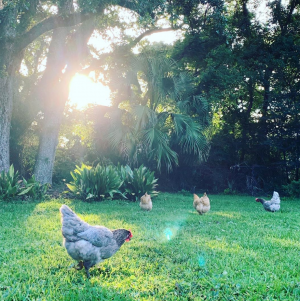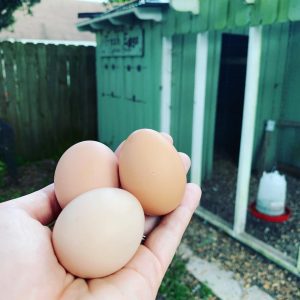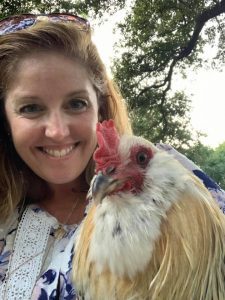Do Instagram posts of pastel farm fresh eggs have you hankerin’ for a life of bucolic delight? Well, you, too, can strut through your yard in Hunter boots and harvest a day’s bounty of nutritious fresh eggs.
Five years ago my family bought a hundred-year-old farmhouse on the Westside of Pensacola. Surveying the near-acre of land available for our use, I mulled the idea of a lavish garden and picturesque chicken coop like a seasoned farmer chewing on a piece of hay. Stepping away from a busy life of soccer games and frequent weekend birthday parties and towards a quieter side of town closer to the grandparents, I wondered, if I could shift my life from one side of town to the other, surely I could also shift my image of preppy, aging, former debutante into a free-ranging, dirt-on-her-hands Earth Mama?
Before you join me in the mud and take one from Old MacD’s book, allow Old Miss Laura to dispel some myths:
 Myth: Anyone can have chickens!
Myth: Anyone can have chickens!
Nu-uh. Know how many birds your city/county allows. Research the ordinance. Protip: Some insurance companies consider over eight birds a “farm” and require a rider, so read your policy, too.
Myth: You need a rooster to have eggs.
Nope. Read a biology book.
Myth: Having chickens is a lot of work.
Not really. But it helps to have the “DTR” conversation, you know, Define the Responsibilities.
Chicken keeping has different levels of effort. Gathering eggs is the easy part.
- Taking care of adorable baby chicks requires daily cage cleaning– fluffy little chicks flying (yes, they fly!) and pooping (yes, they poop!) in your laundry room or garage. (Did I mention they need to be inside for the first 3 or 4 months and don’t lay eggs for upwards of 6 months?!)
- Taking care of mature birds means different things to different keepers. I use the “deep litter” method, so I only clear out the coop four times a year, but that’s a several hour event. I use large feeding and watering buckets relative to my number of birds, so they are fine for a couple of days at a time, but that means the buckets are too big for my kids to help. And we used to let them free range daily, so someone had to let them out and back in, but now they’re pretty confined to their coop and run.
Myth: Chickens are gross.
Well, that depends. They can be, and you do have to be careful.
We’ve never been sick from our birds. We keep a clean (enough) coop using the deep litter method; we have rules about handling the birds (wash your hands; guests stay out of the coop; birds are confined, so the waste isn’t spread around the accessed parts of the yard); we inspect the birds regularly to monitor their health. We use lime and diatomaceous earth to keep odor down especially during the rainy seasons.

Myth: You have to have all the same breed of bird.
Definitely false. I’ve loved mixing a flock of different birds, which results in different egg colors and a beautiful palette of pets. But do consider function over feathers.
- I wanted giant beautiful fluffy-bottomed Disney-princess-movie chickens that would be social but also not attack, and that would tolerate my labrador. And we wanted eggs– lots of them!
- After owning several breeds, I can attest to my Orpingtons (any color variety) being friendly and social and BEAUTIFUL. Still, they get a case of “the vapors” when the temperature and humidity rise above 90 degrees and 90% around here.
- Certain breeds tend to get broodier than others, meaning they want to hatch a “clutch” of eggs. If you want more chicks and have a rooster in the group, then this can be great! If not, a streak of broodiness just stops egg production, and it can be “contagious” as the mood catches on in the flock.
- I recommend Rhode Island Reds and Australorps–friendly enough and champion layers.
- If you want green or blue eggs, do some research; Olive-eggers are a particular mix of breeds producing a light green egg, and Araucanas produce the most beautiful blue.
Myth: Pretty Pinterest-worthy coops make it all worthwhile.
Categorically False. The “farmers’” stores and online sites will tout quaint little chicken coops with fancy hatches and trim and a ramp for them to go up– skip it. Find someone handy and keep the design simple and based on internet research of real chicken owners.
- If you can stand it in to clean it, that’s preferable. If you can’t, you need to be able to move it regularly– check out “tractor coop” styles.
- Use treated wood. The kit coops are rarely treated.
- Make sure there’s a floor that can be cleaned.
- Keep their food off of the ground (mice) and covered from the rain (mold).
- Build the most robust coop you can afford, but plan for and do the best to prevent predator invasion. Perimeter protection is critical.
A little real talk for a moment:
Predators are simply an unavoidable part of owning birds. We’ve suffered sad accidental deaths (a hen strangled in some garden twine being curious in our workshop) and tragic massacres (a raccoon killed all of our birds on a night when one of us –probably a tired working mama who was busy doing dishes and laundry– forgot to close the coop). Admittedly, it’s heartbreaking, but as we take part in the food chain by raising and producing food for ourselves, we have explained to the children that this is part of the risk and responsibility of looking after creatures in the “prey” category. The circle of life and all that…but it’s hard.
More Quick Myths
-
- Double yolks are rare: Actually double yolks can occur in a series– we had four back to back one week!
- Roosters crow at daybreak: More like ALL DAY LONG! (See Myth #1.)
- Chickens can’t fly: Oh yes, they can and will– to the top of a tomato plant or fig tree or any other potential food source.
- Chickens lay one egg every day: That *should* be true, but they also get hot and stop laying, or get broody and stop, or get scared and stop, or respond to changes in barometric pressure and stop. I’ve googled “How do I get my hens to
 start laying again” MANY times (Answers include apple cider vinegar, red pepper flakes in their food, ice baths for broody birds, among others; the internet is your best go-to resource; see sources below.)
start laying again” MANY times (Answers include apple cider vinegar, red pepper flakes in their food, ice baths for broody birds, among others; the internet is your best go-to resource; see sources below.) - Chickens are quiet: Not really. In fact, a hen may cluck out an “egg song” when she or a coop mate produces an egg! It’s their way of celebrating, and it’s adorable. But if you’re trying to keep your birds a secret, and you have neighbors, you won’t be very successful.
- There’s no such thing as a rotten egg! MYTH! And they’re as bad as you’ve been told!
The Good News
You don’t need a ton of land to make backyard chickens comfortable, and you don’t need lots of chickens to enjoy the benefits of having them. Two to three birds in a small manageable tractor style coop is a great way to start.
I love that talking to my children about development and reproduction had the touchstone of this real-life context. I love that our family chores are productive and nurturing/tending tasks. I love that the social structure within the flock– pecking order is real– has been useful for chats with my middle schoolers about social pressures and friendships.
But mostly, I love that my hobby has nourished my family and taught us all about our place in food production.
It roots our family to the land, our little corner of the universe over here on the westside.
And it’s really quite special.
Dare I say… eggstraordinary?
Resources:
She’s a pro and will make you totally jealous of her gorgeous yard and set-up.
My absolute favorite go-to resource for anything chicken-related.
Local Facebook Group: Lower Alabama Chickens
This group helped me create my flock through their postings for chicks and adult birds.
National Facebook Group: Chicken Keeping 101
Great community of pros and amateurs offering advice and sharing information.













